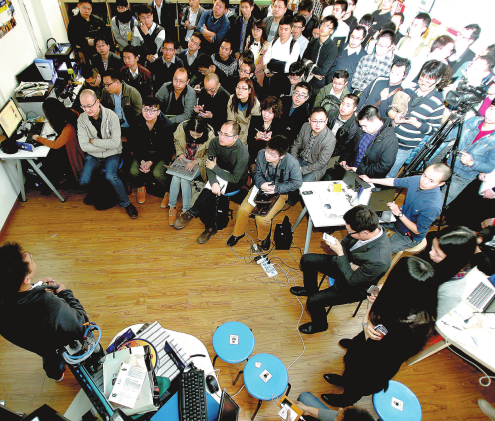 |
|
A lecture hosted at the Chaihuo Makerspace in the Huaqiaocheng area in Shenzhen, Guangdong province, in January, attracted a big crowd. These events included group talks and mini-seminars, and take place regularly in various "makerspaces" in the city, famed for creativity and ideas. [Photo/Xinhua] |
'Makerspaces' in Shenzhen are hothouses of innovation and cutting-edge ideas, but funding and manufacturing advice are desperately needed
Liang Hong'en belongs to a new generation of do-it-yourself entrepreneurs and dreams of running his own company in Shenzhen, Guangdong province.
Known as a "maker", a term coined in Germany and the United States for a growing breed of inventors and tech savvy professionals, he is constantly working on the next "big thing".
With a background in engineering, the 40-year-old recently created a device known as "the intellectual planter", which looks after household plants. It was so novel, Liang's invention picked up a second prize at the China-US Young Maker Competition in Shenzhen in June.
"The intellectual planter is a high-tech plant pot," he said. "It has a LED light and a watering system linked to a mobile app. This allows you to monitor the plant's progress through a smartphone and the app when it needs watering."
But despite his success, Liang is struggling to manufacture and market his product after working out of one of the 100 "makerspaces", which are dotted around the city in the southern Chinese province.
These clusters of innovation were launched to help budding entrepreneurs such as Liang get a foothold in high-tech creative industries.
"I would like to see makerspaces provide other services," he said. "We need help in finding funding and companies that will manufacture and market our products."In China, the country's leadership hopes this emerging group will inject new vitality into an economy that has relied heavily on fixed-asset investment and a massive export drive.
"The maker sector shows the vitality of grassroots entrepreneurship and mass innovation," Premier Li Keqiang said during his visit to Chaihuo in Shenzhen earlier this year. "It will become an eternal engine to support the growth of the Chinese economy in the future."
There are no shortages of "makerspaces" in Chaihuo, which is located in the Huaqiaocheng area of the city's Nanshan district. A hothouse of cutting-edge research and development, up to 4,000 "makers" are registered there.
"Makers do need a place where they can chat, create new ideas and find potential partners," Lin Wei, 33, who designed a smart exercise bike with a games console, said. "But for those who intend to launch a startup, they need to be connected to potential investors.
"They also need help in sorting out the supply chain and manufacturing," he said. "Unfortunately, most makerspaces fail to meet those needs."
The solution to these problems is simple, according to Liang. He would like to see advice centers set up at "makerspaces" to help young entrepreneurs meet potential angel investors and manufacturing companies.
